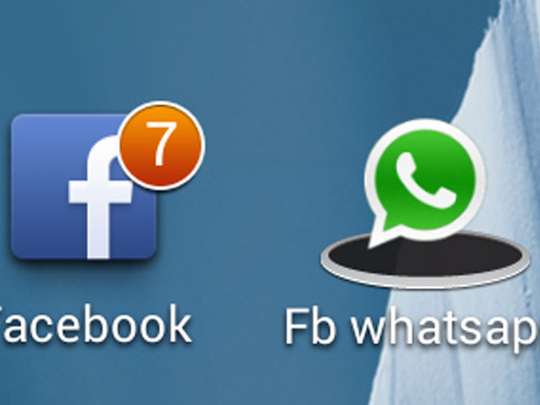
Dubai: WhatsApp is growing fast in the region due to the strong growth in mobile phone and smartphone penetration rates, industry experts told Gulf News on Thursday.
The world’s biggest social networking company said on Wednesday it will pay $19 billion (Dh69.7 billion) to acquiring WhatsApp - paying $12 billion in Facebook stock and $4 billion in cash for WhatsApp.
“Apparently, Facebook will gain more subscribers and expand its mobile services in the Middle East. It makes sense for Facebook to purchase WhatsApp, definitely in the Middle East, as the penetration rates of mobile phones in certain Gulf countries have crossed 100 per cent,” Fadi Salem, the Director of the Governance and Innovation Program, and Fellow, at the Mohammad Bin Rashid School of Government, told Gulf News.
Facebook had 945 million monthly active users worldwide who used mobile products and 1.23 billion monthly active users in 2013.
According to the TRA’s (Telecommunications Regulatory Authority) latest statistics, mobile phone penetration in the UAE is currently at 190.8 per cent and smartphone penetration is 73.8 per cent. Active mobile subscriptions as of November 2013 stood at 15.87 million.
Salem said that Facebook has around 65 million users in the Arab world but we don’t have an estimate on WhatsApp but it is one of the highly-used apps on multiple platforms.
“When technology companies merge, in general, it is not always a good thing for the users despite adding value to business,” Salem said.
Return on investment
Facebook bought Instagram for $1 billion in 2012 and that was very cheap but WhatsApp deal is “very valuable for Facebook in marketing terms” but in financial terms, maybe it is not clear yet how it will bring “good return on investment as the app is free for the first year and after that $1 per year,” he said.
Paul Black, Director of Telecoms and media at research firm International Data Corporation (IDC), said that one thing that is happening to Facebook is that it is not becoming attractive to teens and younger population. It is not that cool it used to be and is slowing down.
In some aspect, he said everyone has a Facebook account. The deal will make the platform closer to the users by combining a suite of messaging and photo services with the Facebook platform.
“WhatsApp is growing faster than Facebook in the Middle East. Messaging was generally a telco topic and SMS was generally used by children, same as BlackBerry Messenger,” he said.
The people are moving away from SMS and moving to instant messaging platform as an important tool.
When Microsoft bought Skype in 2011, the software giant could not make full use of Skype in the region as Voice for Internet Protocol (VoIP) or cheap internet calls was banned in the UAE officially.
Larger subscriber base
Salem said that Skype is an established business model even before Microsoft bought it while WhatsApp model is not clear despite having large number of users. WhatsApp does not have a real model yet, however, the large subscriber base adds value.
“Microsoft is still benefiting from Skype financially and if they can increase the usage or build on the success of Skype on mobile phones, especially Voice for Internet Protocol (VoIP), they can benefit more from Skype,” he said.
Accoring to Black, Skype is not popular in the region because of regulatory controls. A lot of over-the-top (OTT) apps are gaining traction and it is not going to go away. If Skype can work with regulators it can easily grow in the region. Skype is a different platform from WhatsApp.









